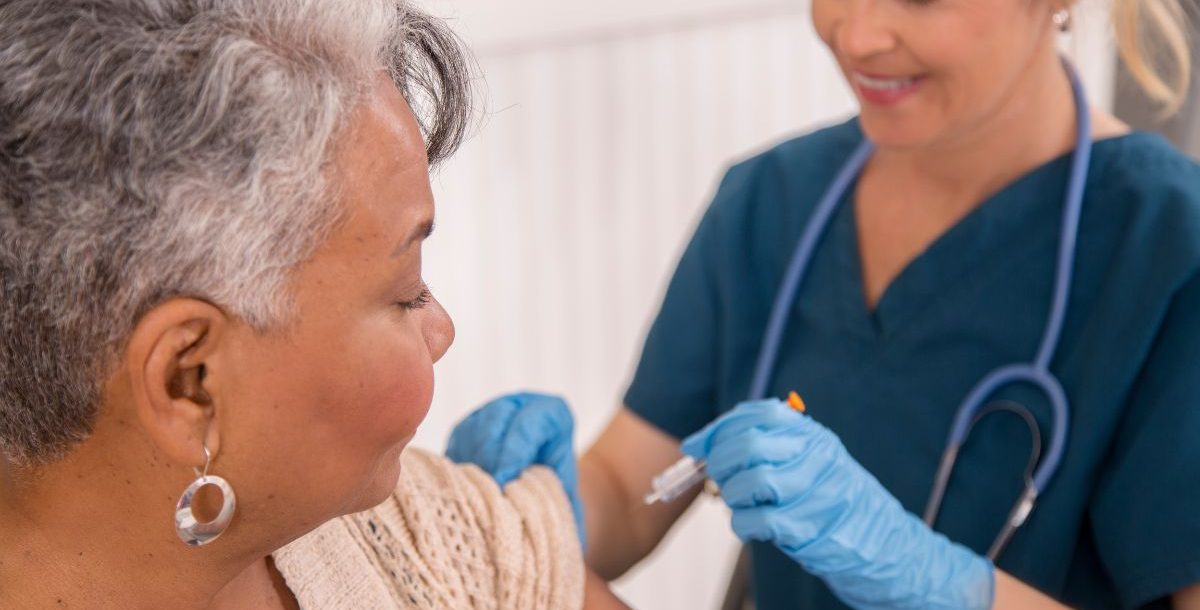Meningococcal disease is an illness that can cause a serious infection called meningitis. Fortunately, there is a vaccine that can help prevent this infection, but in some rare cases, meningitis vaccine side effects can also be serious.
Getting vaccinated with all the recommended vaccines is the best way to protect yourself from meningococcal disease, which can develop into meningitis. As with any medicine, vaccines can cause side effects, usually on the mild side.
First off, what is meningococcal disease and meningitis?
Meningococcal disease is a term referring to any illness caused by a type of bacteria called Neisseria meningitidis. Approximately one in 10 people is a “carrier,” meaning they have meningococcal bacteria in the back of their nose and throat without any symptoms. Meningococcal disease occurs when these bacteria overcome the body’s immune system and causes illnesses.
Is meningococcal disease the same as meningitis?
If you are diagnosed with a meningococcal disease, you don’t necessarily have meningitis. Meningitis is when the infection invades the linings of the brain and spinal cord causing inflammation. Bacterial meningitis requires immediate medical attention, as it is a very severe illness that progresses rapidly.
What are the symptoms of meningitis?
The usual symptoms of meningitis include fever, headache and neck stiffness. Early symptoms of meningitis can be similar to the flu. Often, patients also experience confusion, nausea, vomiting and sensitivity to light.
Meningococcal disease is rare and has declined in the United States since the 1990s, largely thanks to vaccinations. However, it is a severe disease with a significant risk of death or lasting disabilities in people who get it. Meningitis can affect anyone, but is most common in babies, young children, teens and young adults. Again, meningitis can be very serious if not treated quickly.
What is the treatment for meningitis?
Treatment for meningitis typically involves hospitalization and administration of intravenous antibiotics or antivirals, depending on the cause of the infection. Other treatments may include medications to reduce fever and inflammation, fluid and electrolyte replacement as well as supportive care.
Who should get the meningococcal vaccination?
The Centers for Disease Control and Prevention (CDC) recommends the meningococcal vaccine for all preteens and teens. The MenACWY vaccine is recommended for all children between 11 and 12 years old, then a booster dose is recommended when they turn 16. MenB vaccines are also recommended for teenagers between 16 and 18 years old.
Vaccination is also recommended for other children and adults who have an increased risk for meningococcal disease, such as people with medical conditions like sickle cell disease, HIV or a rare hereditary condition called complement component deficiency. Additionally, military recruits as well as first-year college students who aren’t up to date with this vaccine and who will be living in residence halls should strongly consider getting this vaccine.
Talk to your doctor or your child’s doctor about what is best for your specific situation.
Who shouldn’t get the meningitis vaccine?
Some people should not receive the meningitis vaccine because of age or health conditions.
Any person who has had severe or life-threatening allergic reactions after a previous dose of the meningococcal vaccine should not get another dose of the same type of vaccine. Also, pregnant and breastfeeding people should talk to their doctor about the benefits versus risks of vaccination. People who have a mild illness such as a cold can typically get vaccinated. However, those with moderate to severe illness should wait until they have recovered.
Again, your health care provider can help you decide if it is appropriate for you to get the meningitis vaccine, which of the types of meningococcal vaccines to get and when to get it.
What are meningitis vaccine side effects?
MenACWY vaccines can cause common side effects that come with many vaccines, such as injection site reactions (redness, soreness, mild swelling), headache, tiredness and muscle pains. MenB vaccines can cause these same symptoms as well as fever, chills, nausea and diarrhea.
Very rarely, more serious problems can occur after getting any vaccine. These include fainting and injuries caused by a fall due to fainting. Sitting or lying down for a few minutes after a vaccination can help prevent this. You should tell your health care provider if you experience dizziness or notice any ringing in the ears or vision changes after getting a vaccine.
In a very small number of people, a vaccine can cause a serious and potentially life-threatening allergic reaction. If you have had an allergic reaction to any vaccine before, be sure to tell your health care provider before taking the meningitis vaccine.
How long do side effects of meningococcal vaccines last?
The mild side effects of MenACWY vaccines typically last for one to two days, and those from MenB vaccines usually last for three to five days. These side effects typically go away on their own. However, let your doctor know if these side effects persist or worsen.
Serious reactions are possible, but rare. Additionally, teens are more likely to have side effects after MenB vaccination compared to other vaccines given to preteens and teens.
When should I call my doctor about meningitis vaccine side effects?
An allergic reaction could occur as soon as the vaccinated person leaves the clinic. If you see signs of a severe allergic reaction, such as hives, swelling of the face and throat, difficulty breathing, a fast heartbeat, dizziness or weakness, call 911 and/or get the person to the nearest hospital. For other signs that concern you, call your health care provider.
Now that you know the meningitis vaccine side effects, you can be prepared.
Learn about the primary care services we provide at Bon Secours.





